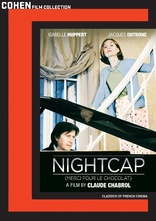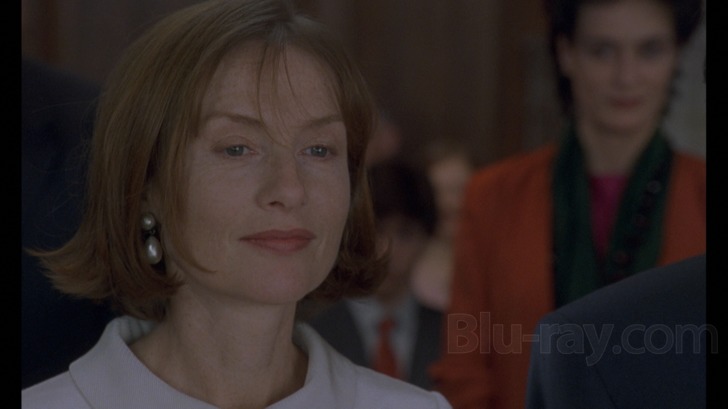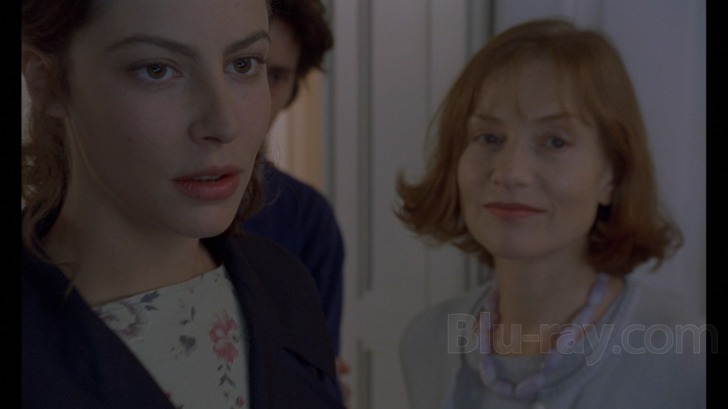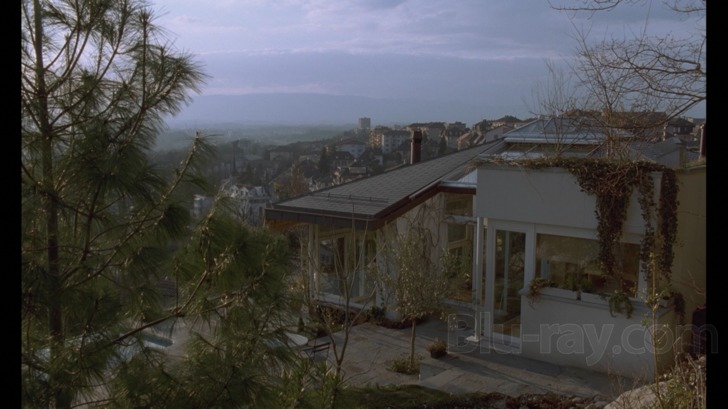Nightcap Blu-ray Movie
HomeNightcap Blu-ray Movie 
Merci pour le ChocolatCohen Media Group | 2000 | 100 min | Not rated | Sep 30, 2014

Movie rating
6.9 | / 10 |
Blu-ray rating
| Users | 0.0 | |
| Reviewer | 4.0 | |
| Overall | 4.0 |
Overview
Nightcap (2000)
In Lausanne, the aspirant pianist Jeanne Pollet has lunch with her mother Louise Pollet, her boyfriend Axel and his mother. Lenna learns that when she was born, a nurse had mistakenly told to the prominent pianist André Polonski that she would be his daughter. André has just remarried his first wife, the heiress of a Swiss chocolate factory Marie-Claire "Mika" Muller and they live in Lausanne with André's son Guillaume Polonski. Out of the blue, Jeanne visits André and he offers to give piano classes to help her in her examination. Jeanne becomes closer to André and sooner she discovers that Mika might be drugging her stepson with Rohypnol. Further, she might have killed his second wife Lisbeth.
Starring: Isabelle Huppert, Jacques Dutronc, Anna Mouglalis, Michel Robin, Mathieu SimonetDirector: Claude Chabrol
| Foreign | Uncertain |
| Drama | Uncertain |
| Crime | Uncertain |
| Mystery | Uncertain |
| Psychological thriller | Uncertain |
| Thriller | Uncertain |
Specifications
Video
Video codec: MPEG-4 AVC
Video resolution: 1080p
Aspect ratio: 1.67:1
Original aspect ratio: 1.66:1
Audio
French: LPCM 2.0 (48kHz, 24-bit)
Subtitles
English
Discs
50GB Blu-ray Disc
Single disc (1 BD)
Playback
Region A (locked)
Review
Rating summary
| Movie | 3.5 | |
| Video | 4.0 | |
| Audio | 4.0 | |
| Extras | 1.5 | |
| Overall | 4.0 |
Nightcap Blu-ray Movie Review
Death by chocolate.
Reviewed by Jeffrey Kauffman October 2, 2014What’s in a name? Quite a bit, at least if you’re willing to dig a bit for meaning. Claude Chabrol’s 2000 film bears the original title Merci pour le chocolat, which even a beginning French student can probably translate as “thanks for the chocolate”. Somehow that got morphed into Nightcap for the domestic release, at least with regard to a quick subtitle which appears comically underneath the original French title, kind of like those old dubbed Toho Godzilla films where the Japanese actors’ mouths would keep moving for what seemed like minutes after the English voice actor had emitted a word or two. Nightcap tends to hint at one of the already none too subtle plot points of Chabrol’s film, though truth be told, Merci pour le chocolat may do more or less the same thing, albeit perhaps a bit more discursively. The film was actually based upon a novel by Charlotte Armstrong entitled The Chocolate Cobweb, a kind of deliciously (sorry) mixed image that might be the subtlest moniker but which Chabrol obviously took to heart, as he fills the film with not just all sorts of spidery intrigue, but allusions to actual spiders and cobwebs as well. No matter what the title, Merci pour le chocolat is one of the more notable films in Chabrol’s longstanding Hitchcock obsession. Chabrol is often termed Hitchockian, but in my estimation it’s a likeness more in theory than in actual practice. While Chabrol like Hitchcock loves to pick the scab off of complacent middle class existence, exposing an often unseemly underbelly, he rarely engages in the sorts of showy set pieces that are often used in “greatest hits” clip reels of Hitchcock’s long and august career. Chabrol never really goes for the jugular in Merci pour le chocolat, instead focusing on character interactions that may indeed turn (or even already have turned) murderous, without really making that much of the central crime. Chabrol’s focus is therefore more on the interior world of his characters rather than the external manifestations of their psychologies. In other words, had Chabrol directed Psycho, for example, it's entirely possible there would have been nothing like the iconic shower scene to get the adrenaline flowing. Chabrol could very well have been content to simply explore Norman's psyche with subtler fare, perhaps more scenes like Hitchcock's Chabrolian moment where Norman peers through a peephole at a stripping Marion Crane.

Chabrol keeps his cards resolutely close to his vest in many of his so-called thrillers, and his willing accomplice in several of these films is the inimitable albeit frequently inscrutable Isabelle Huppert, who in Merci pour le chocolat portrays Mika Muller, an heiress to a chocolate fortune who as the film begins is re-marrying her ex-husband André Polonski (Jacques Dutronc), a famed concert pianist. The Muller-Polonski nuptials are a time of seeming joy, despite the admitted oddity of a once divorced couple deciding to tie the knot again, but even amidst the celebration, lots of tongues are wagging in typically Chabrolian fashion. The facades of the bourgeoisie are almost always fragile in a Chabrol film, and here the “beautiful couple” of Mika and André are already perhaps teetering on the edge of some sort of collapse. Huppert’s enigmatic smile serves as a warning that surfaces are not to be believed here—anyone can pretend to be anything, and Mika seems to be an expert pretender.
After the opening sequence which introduces Mika, André, and André’s son Guillaume (Rodolphe Pauly) by his deceased second wife, Chabrol then segues somewhat perplexingly to another set of characters, including young aspiring pianist Jeanne Pollet (Anna Mouglalis). While this initially seems to be something of a strange detour, soon the two strands are woven together when Jeanne shows up at the gothic Polonski mansion one evening to announce she believes she’s actually André’s biological child, since there had been a mixup at the hospital on the day when both Jeanne and Guillaume were born. This “switched at birth” scenario has been done to death in any number of offerings that tend to air on outlets like Lifetime, but Chabrol invests the material with a cool menace and darkly foreboding undertones.
Jeanne’s assertions actually start to carry some weight with an initially skeptical André, especially after Jeanne displays her piano artistry. Guillaume is not just completely talentless, but also strangely unambitious given his overachieving father, and due to these factors as well as Jeanne’s obvious resemblance to André’s deceased wife, the “established order” of the Polonski household is rent asunder. And through it all Mika smiles enigmatically, as if to suggest she has everything under control.
Some may feel that Merci pour le chocolat is too obvious by half, and there’s no denying that Chabrol is not very circumspect in laying out Mika’s devilish side. But again, Chabrol is not all that interested in ginning up suspense in a traditional way—though the film’s final sequence with Mika reliving history in a way by trying to deal with Jeanne the way she dealt with a previous “problem”, comes close. Instead, Chabrol concentrates on the seemingly irreconcilable tension between Mika’s picture perfect exterior and the roiling emotions that are simmering just beneath her elegant surface.
Because of the inherent iciness of Mika’s character, Huppert never really is given an opportunity to display much more than a coldly calculating quality (the closing moments probably give her her best showcase in the film). That leaves the bulk of the film’s emotional pyrotechnics up to the younger performers, Pauly as Guillaume and Mouglalis as Jeanne. There’s some really interesting insight here into Guillaume’s sadness at never having measured up to his father’s artistic capabilities, a fact now exacerbated by the devastating knowledge that he may not even be André’s real son, while Jeanne navigates a world that is decidedly more dangerous than she initially fantasized about when first confronted with the fact that a famed pianist might be her father. Both performers do good work here, bringing a bit of intensity to the film that is otherwise intentionally almost comically polite.
Nightcap Blu-ray Movie, Video Quality 

Merci pour le chocolat is presented on Blu-ray courtesy of Cohen Film Collection with an AVC encoded 1080p transfer in 1.67:1. There is some negligible, almost unnoticeable, minor damage that occasionally crops up here, but overall the elements are in sterling condition with very few distractions. Colors are natural looking and nicely saturated. The image isn't razor sharp, but that's at least partially by design, and close- ups reveal commendable fine detail in things like the various fabrics of Mika's elegant wardrobe, or even small smudges on the side of one of André's concert grand pianos. Though this is largely made up of interior sequences, a couple of brief outdoor scenes offer fantastic depth of field. There are no signs of problematic digital intrusion of any kind and no compression artifacts of any note.
Nightcap Blu-ray Movie, Audio Quality 

Merci pour le chocolat's original French language track is presented in LPCM 2.0. As is often the case, Chabrol's son Matthieu contributes a somewhat anachronistic score, though in this case those contributions are a bit less problematic than usual since the film is filled to the brim with classical source cues (including repeated use of Liszt's Funerailles. Music and dialogue all sound fine, with no hints of distortion or any damage. Occasional ambient environmental effects are well prioritized, and fidelity is excellent throughout the track.
Nightcap Blu-ray Movie, Special Features and Extras 

- 2014 Re-release Trailer (1080p; 1:53)
- Feature Length Audio Commentary by Film Critics Wade Major and Andy Klein. The two California-based critics offer some excellent insight into Chabrol's approaches, while also discussing everything from the source novel to the allure of Huppert.
Nightcap Blu-ray Movie, Overall Score and Recommendation 

There's a very dark (chocolate?) sense of humor wending its way through this film, and in fact some may want to see it as almost a comedy of manners. Mika is exceptionally well mannered, of course, but she's also decidedly lethal. If one can divorce this Chabrol effort from preconceived notions of what a thriller is "supposed" to be, Merci pour le chocolat offers a lot of interest, if frankly not that much actual intrigue. Buoyed by an exceptionally devious performance by Huppert, as well as good supporting work from her "foil", Mouglalis, and bearing Chabrol's instantly recognizable touch which skewers the placid demeanor of the bourgeoisie, Merci pour le chocolat comes Recommended.
Similar titles
Similar titles you might also like
(Still not reliable for this title)

The Color of Lies
Au coeur du mensonge
1999

The Swindle
Rien Ne Va Plus | 4K Restoration
1997

The Flower of Evil
La fleur du mal | 4K Restoration
2003

Mother
마더 / Madeo
2009

Diabolique
Les diaboliques
1955

Everybody Knows
Todos lo saben
2018

Elle
2016

The Third Murder
三度目の殺人
2017

The Possessed
La donna del lago
1965

Confessions
2010

Betty
1992

Insomnia
1997

Torment
L'enfer
1994

High and Low 4K
天国と地獄 / Tengoku to jigoku
1963

Le Corbeau
The Raven
1943

The American Friend
Der amerikanische Freund
1977

Tell No One
Ne le dis à personne
2006

La Cérémonie
1995

Pieta
피에타
2012

M
M - Eine Stadt sucht einen Mörder / German and English Versions
1931
